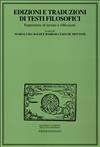
BOOKS BY PIERLUIGI DONINI





The essay attempts to discover the source (or sources) of the Platonic genealogy which was common to some middle Platonic philosophers, especially Plutarch, and to all the Neoplatonists from Plotinus onwards. In this philosophical genealogy Plato is the heir of Pythagoras and Aristotle the heir of Plato. The Pythagorean genealogy of Plato is clearly present in Cicero’s works and could have been suggested to him by more than one source: above all Posidonius rather than Antiochus, the peripatetic tradition or the Old Academy. Aristotle, however, is not mentioned. In order to explain his presence in the Platonic and Pythagorean genealogy recorded by Plutarch, we need to look to the influence of the pseudo-Pythagorean treatises and to the works of Eudorus. Through the Alexandrian milieu, this Platonic philosopher had some familiarity with Aristotle’s works and, most probably, also with some pseudo-Pythagorean treatises - possibly some of those that have come down to us and are a mix of Platonic, Pythagorean and Aristotelian tenets.





Esperienze di lavoro e riflessioni
cod. 496.1.63

Il libro Lambda della Metafisica di Aristotele (di Pierluigi Donini) - ABSTRACT: La struttura e l’argomentazione del libro Lambda della Metafisica sono condizionate dalla questione della possibilità di stabilire se esista o no un unico principio comune a tutte quante le sostanze possibili, sensibili e sovrasensibili. La discussione del libro, non conclusiva, lascia indeciso il problema: un esito spiegabile riferendo la formulazione di questo - e l’origine del libro - alla situazione di Aristotele negli anni dell’Academia, dove l’accettazione di princìpi comuni a tutte le cose si accompagnava alla convinzione che ci fosse un’unica scienza generale per tutte le sostanze (nel linguaggio academico: la "fisica"). Nel libro Lambda la classica distinzione aristotelica tra la fisica e la filosofia prima non riesce perciò ad essere stabilita.

Intersezioni possibili
cod. 886.18